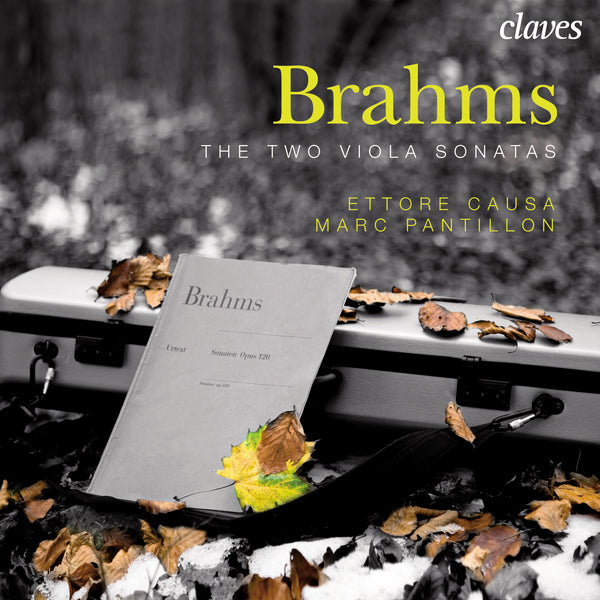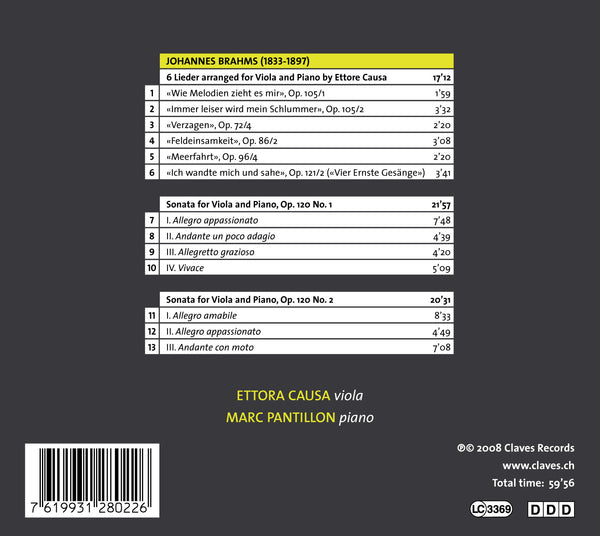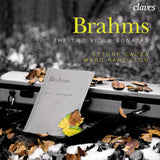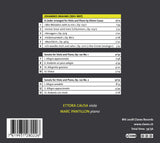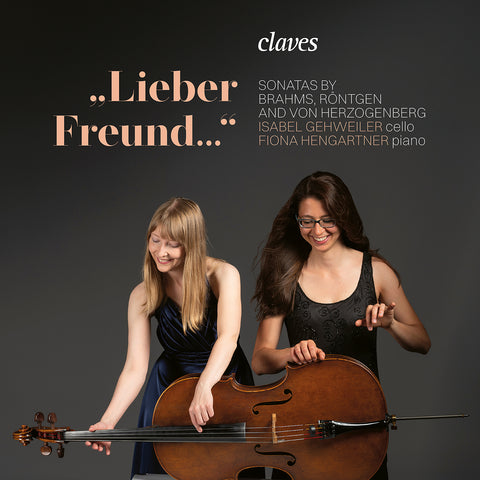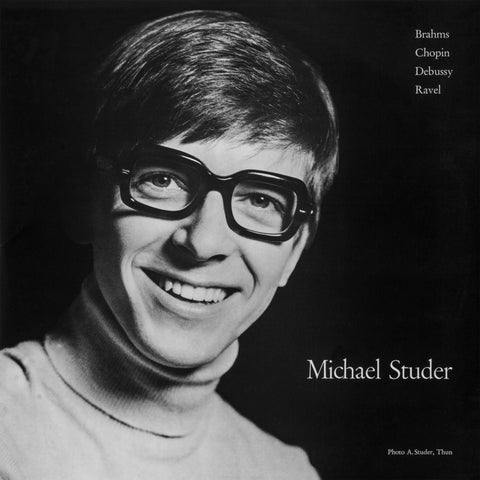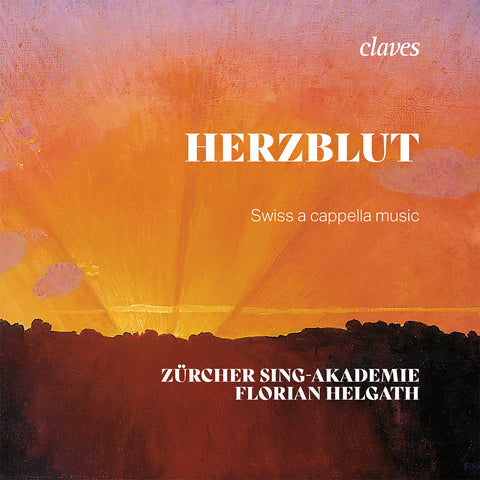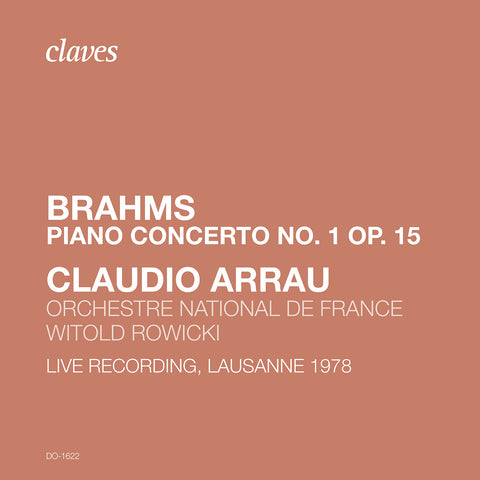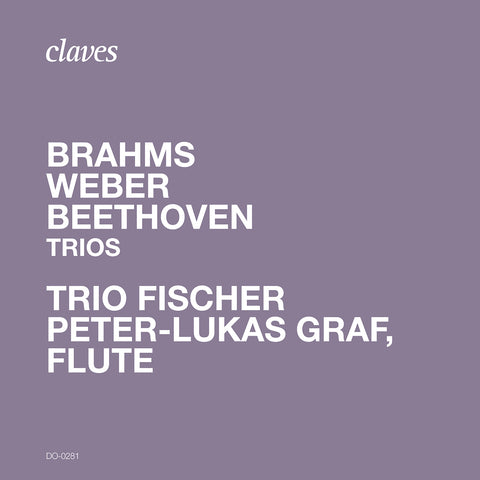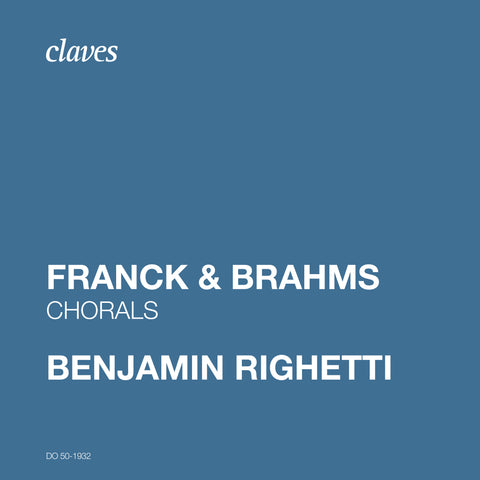(2008) Brahms: Six Lieder, arrangement for Viola and Piano - The Two Viola Sonatas
Kategorie(n): Operngesang Piano
Instrument(e): Piano Viola
Hauptkomponist: Johannes Brahms
CD-Set: 1
Katalog Nr.:
CD 2802
Freigabe: 2008
EAN/UPC: 7619931280226
- UPC: 884385198602
Dieses Album ist jetzt neu aufgelegt worden. Bestellen Sie es jetzt zum Sonderpreis vor.
CHF 18.50
Dieses Album ist nicht mehr auf CD erhältlich.
Dieses Album ist noch nicht veröffentlicht worden. Bestellen Sie es jetzt vor.
CHF 18.50
Dieses Album ist nicht mehr auf CD erhältlich.
CHF 18.50
Inklusive MwSt. für die Schweiz und die EU
Kostenloser Versand
Dieses Album ist nicht mehr auf CD erhältlich.
Inklusive MwSt. für die Schweiz und die EU
Kostenloser Versand
Dieses Album ist jetzt neu aufgelegt worden. Bestellen Sie es jetzt zum Sonderpreis vor.
CHF 18.50
Dieses Album ist nicht mehr auf CD erhältlich.
This album has not been released yet.
Pre-order it at a special price now.
CHF 18.50
Dieses Album ist nicht mehr auf CD erhältlich.
CHF 18.50
Dieses Album ist nicht mehr auf CD erhältlich.
SPOTIFY
(Verbinden Sie sich mit Ihrem Konto und aktualisieren die Seite, um das komplette Album zu hören)
BRAHMS: SIX LIEDER, ARRANGEMENT FOR VIOLA AND PIANO - THE TWO VIOLA SONATAS
One might think that they were made for each other. Wager won! Not only did the Italian viola player and the Swiss pianist immediately hit it off; but they created the image of a perfect communion with Brahms and his music for Jean-Claude Gaberel’s recording microphones.
Northern Autumn
Brahms has been Ettore Causa’s composer of preference since he was a young boy. Marc Pantillon; for his part; didn’t really begin to understand the composer until the beginning of adolescence; in contrast to his other “idol”; Beethoven; “whose language was always perfectly natural and evident to me”. “For me; Brahms’ writing is situated at the point of perfect equilibrium: his harmonies; so expressive and rich in colors; are always underlined by a voice leading which is both rigorous and inventive.
His phrases; marked by exuberant lyricism; are sensual without ever turning to sentimentality.” Ettore Causa likewise believes the German composer’s music to have reached a form of perfection. “It is filled with powerful emotions and perfectly constructed. Brahms’ music has a permanent touch of the colors of a Northern Autumn; a sort of latent melancholy; something painful but always expressed with nobility.”
Mature Songs
In the tradition of Weber; Schubert and Mendelssohn; Brahms left some 200 songs as well as 91 harmonizations of folk songs and 80 vocal duets and quartets with piano. A magnificent legacy that has remained unrecognized for the most part. Ettore Causa succumbed to the charms of this repertoire during his studies in Switzerland. “I remember spending a fortune for the complete repertoire as performed by giants such as Dietrich Fischer-Dieskau; Jessy Norman and Daniel Barenboim.
I was totally immersed in the beauty of these works and told myself that it would be a good idea to perform some of them on the viola.” The choice wasn’t easy. “They are all so beautiful!” The violist finally narrowed his choice to six songs that “were particularly well-suited to the instrument and at the same time constituted a unity.” They were all composed in the composer’s mature years; beginning with Opus 121 No. 1 from the “Vier Ernste Lieder” [four serious songs]; the veritable fulfillment of this genre (1896). Opus 105 was written on the shores of Lake Thun in the summer of 1886; the culmination of his love songs. And “Meerfahrt” [sea journey] likewise represents a final point: the short and intense collaboration with Heinrich Heine; “poet in exile”.
Antonin Scherrer
(Translation: Mark Manion)
(2008) Brahms: Six Lieder, arrangement for Viola and Piano - The Two Viola Sonatas - CD 2802
It is the kind of encounter that gives meaning to the occupation of a recording producer. Ettore Causa and Marc Pantillon did not know one another before this recording. They both have one or more recordings in the Claves catalogue; Causa is the author of a collection of transcriptions of romantic music that cried out for a follow-up with a “weightier” repertoire; and Pantillon; father of a solo recording featuring Brahms that likewise demanded a sequel.
One might think that they were made for each other. Wager won! Not only did the Italian viola player and the Swiss pianist immediately hit it off; but they created the image of a perfect communion with Brahms and his music for Jean-Claude Gaberel’s recording microphones.
Northern Autumn
Brahms has been Ettore Causa’s composer of preference since he was a young boy. Marc Pantillon; for his part; didn’t really begin to understand the composer until the beginning of adolescence; in contrast to his other “idol”; Beethoven; “whose language was always perfectly natural and evident to me”. “For me; Brahms’ writing is situated at the point of perfect equilibrium: his harmonies; so expressive and rich in colors; are always underlined by a voice leading which is both rigorous and inventive.
His phrases; marked by exuberant lyricism; are sensual without ever turning to sentimentality.” Ettore Causa likewise believes the German composer’s music to have reached a form of perfection. “It is filled with powerful emotions and perfectly constructed. Brahms’ music has a permanent touch of the colors of a Northern Autumn; a sort of latent melancholy; something painful but always expressed with nobility.”
Mature Songs
In the tradition of Weber; Schubert and Mendelssohn; Brahms left some 200 songs as well as 91 harmonizations of folk songs and 80 vocal duets and quartets with piano. A magnificent legacy that has remained unrecognized for the most part. Ettore Causa succumbed to the charms of this repertoire during his studies in Switzerland. “I remember spending a fortune for the complete repertoire as performed by giants such as Dietrich Fischer-Dieskau; Jessy Norman and Daniel Barenboim.
I was totally immersed in the beauty of these works and told myself that it would be a good idea to perform some of them on the viola.” The choice wasn’t easy. “They are all so beautiful!” The violist finally narrowed his choice to six songs that “were particularly well-suited to the instrument and at the same time constituted a unity.” They were all composed in the composer’s mature years; beginning with Opus 121 No. 1 from the “Vier Ernste Lieder” [four serious songs]; the veritable fulfillment of this genre (1896). Opus 105 was written on the shores of Lake Thun in the summer of 1886; the culmination of his love songs. And “Meerfahrt” [sea journey] likewise represents a final point: the short and intense collaboration with Heinrich Heine; “poet in exile”.
Antonin Scherrer
(Translation: Mark Manion)
Return to the album | Composer(s): Johannes Brahms | Main Artist: Ettore Causa







